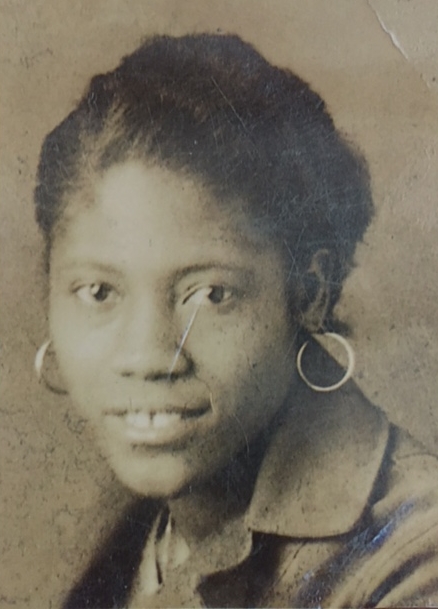|
Rosa Brown Howcutt Joyner of Edenton, North Carolina passed
away on 12 October 2008. The following tribute was written by her grandson
Brian D. Joyner.
My grandmother died last week at
the age of 101. I mention this not to elicit sympathy, but to use it to
examine what a legacy means. In the past few years, pieces of her life beyond
being a grandmother came to light for me. In this revealing, she became more
real and less of the blissful presence who was always a grandmother, with the
big white house, the flowers, and the stray cats that came to the back door
and could always expect a meal. My father said in his eulogy that every one
of us, regardless of where we fall in the genealogy, were directly impacted
by her. Here is how.
 Rosa Brown Howcutt Joyner was born in 1906, just one
generation after the end of the Civil War. My grandmother taught for 41
years, raised 4 children, had 9 grandchildren, and 10 great grandchildren.
She received a B.A. from St. Augustine's College, got a masters' degree from
Elizabeth City Teaching College (now Elizabeth City State University) by
1929, the same year she married my grandfather, George W. Joyner. Both were
educators in Edenton, NC. All kind of remarkable when you think that her
grandparents were born into slavery and she lived in the Jim Crow South. I
had the luxury of attending any school I wanted (well, that my grades could
get me into), in part because of this. I also had very little choice in
whether or not I was going to college because of this, too. All of her kids
have at least undergrad degrees and they had the same options about their
college educations that I did. Like none. Striving and learning are ingrained
parts of all of us. Rosa Brown Howcutt Joyner was born in 1906, just one
generation after the end of the Civil War. My grandmother taught for 41
years, raised 4 children, had 9 grandchildren, and 10 great grandchildren.
She received a B.A. from St. Augustine's College, got a masters' degree from
Elizabeth City Teaching College (now Elizabeth City State University) by
1929, the same year she married my grandfather, George W. Joyner. Both were
educators in Edenton, NC. All kind of remarkable when you think that her
grandparents were born into slavery and she lived in the Jim Crow South. I
had the luxury of attending any school I wanted (well, that my grades could
get me into), in part because of this. I also had very little choice in
whether or not I was going to college because of this, too. All of her kids
have at least undergrad degrees and they had the same options about their
college educations that I did. Like none. Striving and learning are ingrained
parts of all of us.
Rosa B., as she was called played
organ and sang for the choirs at Kadesh AME Zion Church for more than 50
years, so music has always been part of her life and ours. But, I found out
that she "ran away" from school to join Silas Green from New
Orleans' vaudeville show as a dancer when she was younger. The black
vaudeville troupe, from 1904 to 1957, was one of the largest and best known
tent shows in the country. She graduated on time, so her stint was relatively
short-lived but it explains why so many of my family members have an interest
in performing and music. My father was a music major, my aunt, a music
teacher who developed teaching techniques for guitar and piano for primary
school-aged children around the nation. My brother, sister, cousin, and myself have all performed with bands and as solo artists.
And every one played an instrument at some point, whether you wanted to or
not.
 I'd heard how tough she could be. She had a certain
hardness beneath the sweet smile and soft voice, a core of steel that if you
pushed, you found it. I knew the stories of the punishments, the switches
that her kids had to choose for their punishment, being forced to go and
defend themselves when they were scared. And yet, she indulged her
grandchildren and great-grandchildren, listening to our petty rants and
concerns. She was Grandma. I'd heard how tough she could be. She had a certain
hardness beneath the sweet smile and soft voice, a core of steel that if you
pushed, you found it. I knew the stories of the punishments, the switches
that her kids had to choose for their punishment, being forced to go and
defend themselves when they were scared. And yet, she indulged her
grandchildren and great-grandchildren, listening to our petty rants and
concerns. She was Grandma.
It's important to have continuity,
to understand who you are based on who your people are. So often as men, we
talk about creating legacies when, in actuality, we are adding to the ones
that we are tied to already. I'm reminded of the man who asked me my name
when I visited his shop. I told him my first name and he said "No,
what's your family's name? Who are you people?" And in that moment, I
was reminded that no matter how hard I sought to put my own mark on the
world, I was inextricably linked to the Joyners,
the Colemans, the McGees,
the Browns, the Dukes and the Howcotts, and that I was a reflection of all of
them. Understanding your history, all of it, is critical. Being a better guy
starts with knowing who you are. People and things try to take you away from
you, but it's nearly impossible when you know where you come from
|